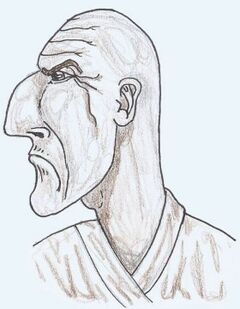Vorbis
| Vorbis | |
 | |
| Name | Vorbis |
| Race | Human |
| Age | |
| Occupation | Head of the Quisition |
| Physical appearance | Bald, black-eyed |
| Residence | Omnia |
| Death | |
| Parents | |
| Relatives | |
| Children | |
| Marital Status | s |
| Appearances | |
| Books | Small Gods |
| Cameos | |
Deacon Vorbis was the head of the Omnian Quisition during the early life of Brutha. He was undoubtedly the most feared man in Omnia, and pursued the Church's imperialistic goals with incredible zeal. Despite his fanatical devotion, for the greater part of his life he did not rise above the position of Deacon, a result of his position in the Quisition.
This changed following a visit to Ephebe, an aggressive diplomatic mission that ultimately ended in failure. He was carried unconscious across the desert by Brutha but, upon his recovery, he knocked the novice out and carried him into the Citadel. He took the credit for the entire journey and was made Cenobiarch, and was declared to be the Eighth Prophet despite never hearing the voice of Om. (Although this seems erroneous, none of the previous Prophets heard Om either). However, despite his claims, Om was not on his side, as was demonstrated when Om Himself killed Vorbis by falling onto his head in his tortoise form. Brutha then became the Eighth Prophet.
According to Death, after the trip through the desert he would find Hell. When Brutha died he chose to travel through the desert with Vorbis.
Physically, he was over six feet tall and stick-thin, with a shaven head (and everything else, in fact) and an aquiline nose. His eyes were almost entirely black, thanks to his being descended from one of the deep desert tribes.
Psychologically, he was held to be beyond insanity by some that had experienced him, and the god Om described his mind as a steel ball - nothing went in, and nothing came out; all he heard when he prayed was the sound of his own thoughts coming back to him.
While he did things that were appallingly evil, he never seemed to do evil for the sake of evil; one might describe him as being functionally amoral, while believing himself to actually be very moral.
Annotation
The great tragedian Aeschylus is widely held to have been killed at Gela, Sicily, by a tortoise which fell out of the sky when dropped by an eagle, although this is also widely held to have been apocryphal.
Aeschylus (c.524/525 BC – c.455/456 BC) was the first of the three ancient Greek tragedians whose work has survived, the others being Sophocles and Euripides, and is often recognized as "the father of tragedy".